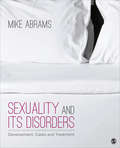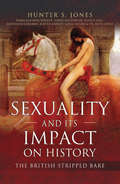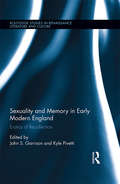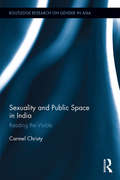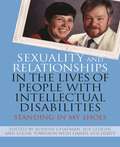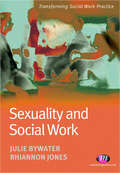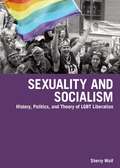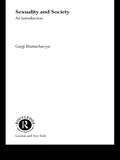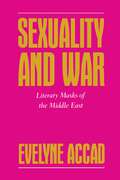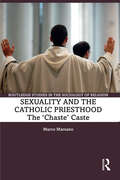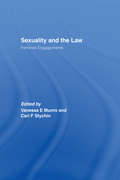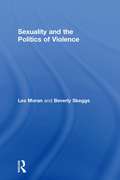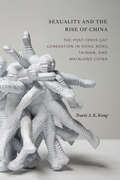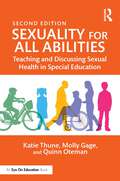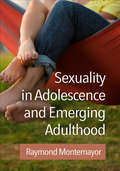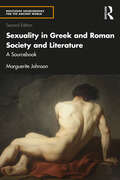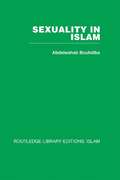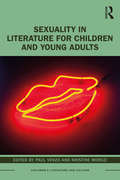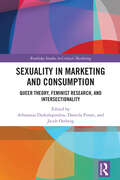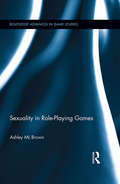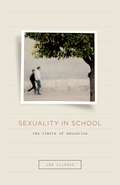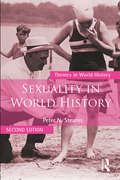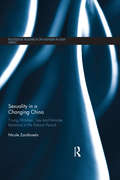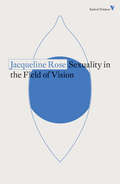- Table View
- List View
Sexuality and Its Disorders: Development, Cases, and Treatment
by Mike AbramsSexuality and Its Disorders explores sexuality from an evolutionary perspective using powerful, real-life case studies to help readers provide effective guidance around issues relating to sexuality. Drawing on his 30 years of clinical experience and research, author Mike Abrams provides a comprehensive, evidence-based, and clinically-oriented text with cutting-edge coverage throughout. Discussions include the physical and psychological development of sexual identity; the social aspects of sexual behavior; the many expressions of sexuality; cognitive behavior treatment of sexual problems; and more. The many perspectives of sexuality are examined with interviews and commentaries from major figures in the field—including David M. Buss, Helen Fisher, C. Sue Carter of Kinsey, Todd K. Shackelford, Ken Zucker, and Gordon Gallup—who discuss such topics as the origins of sexuality, the nature of love, the role of attachment, and the treatment of sexual problems.
Sexuality and Its Disorders: Development, Cases, and Treatment
by Mike AbramsSexuality and Its Disorders explores sexuality from an evolutionary perspective using powerful, real-life case studies to help readers provide effective guidance around issues relating to sexuality. Drawing on his 30 years of clinical experience and research, author Mike Abrams provides a comprehensive, evidence-based, and clinically-oriented text with cutting-edge coverage throughout. Discussions include the physical and psychological development of sexual identity; the social aspects of sexual behavior; the many expressions of sexuality; cognitive behavior treatment of sexual problems; and more. The many perspectives of sexuality are examined with interviews and commentaries from major figures in the field—including David M. Buss, Helen Fisher, C. Sue Carter of Kinsey, Todd K. Shackelford, Ken Zucker, and Gordon Gallup—who discuss such topics as the origins of sexuality, the nature of love, the role of attachment, and the treatment of sexual problems.
Sexuality and Its Impact on History: The British Stripped Bare
by Hunter S. Jones&“Tales of Lady Godiva, Medieval love traditions, shocking tales from the Tudor court and prostitution during the Victorian era . . . highly addictive.&”—Chicks, Rogues and Scandals Would you swig a magic potion or plot to kill your husband in order to marry your lover? These are just two of the many romantic and sexual customs from British history that you will explore as eight authors take us through the centuries, revealing that truth is stranger than fiction when it comes to love. From bizarre trivia about courtly love, to techniques and prostitution, you&’ll encounter memorable nuggets of provocative information that you&’ll want to share. It's all here: ménage a trois, chastity belts, Tudor fallacies, royal love and infidelity, marriage contracts (which were more like business arrangements), brothels, kept women, and whorehouses. Take a peek at what really happened between the sheets. Each story provides you with shocking detail about what was at the heart of romance throughout British history.Sexuality and Its Impact on History: The British Stripped Bare chronicles the pleasures and perils of the flesh, sharing secrets from the days of the Anglo-Saxons, medieval courtly love traditions, diabolical Tudor escapades—including those of Anne Boleyn and Mary Queen of Scots—the Regency, and down to the &“prudish&” Victorian Era. This scholarly yet accessible study brings to light the myriad varieties of British sexual mores. &“A fascinating book by Hunter S Jones, charting the hidden sexual history of Britain.&”—Daily Mail
Sexuality and Memory in Early Modern England: Literature and the Erotics of Recollection (Routledge Studies in Renaissance Literature and Culture)
by John S. Garrison Kyle PivettiThis volume brings together two vibrant areas of Renaissance studies today: memory and sexuality. The contributors show that not only Shakespeare but also a broad range of his contemporaries were deeply interested in how memory and sexuality interact. Are erotic experiences heightened or deflated by the presence of memory? Can a sexual act be commemorative? Can an act of memory be eroticized? How do forms of romantic desire underwrite forms of memory? To answer such questions, these authors examine drama, poetry, and prose from both major authors and lesser-studied figures in the canon of Renaissance literature. Alongside a number of insightful readings, they show that sonnets enact a sexual exchange of memory; that epics of nationhood cannot help but eroticize their subjects; that the act of sex in Renaissance tragedy too often depends upon violence of the past. Memory, these scholars propose, re-shapes the concerns of queer and sexuality studies - including the unhistorical, the experience of desire, and the limits of the body. So too does the erotic revise the dominant trends of memory studies, from the rhetoric of the medieval memory arts to the formation of collective pasts.
Sexuality and Public Space in India: Reading the Visible (Routledge Research on Gender in Asia Series)
by Carmel ChristyThe topic of sexuality and gender within the South Asian context is timely and widely discussed across a variety of academic disciplines. Since the end of the last century, there have been debates in the cultural sphere in India on issues concerning Lesbian Gay Bisexual Transgender people’s rights, gender, sex workers’ rights and caste. There has also been an explicit visibility for sexuality in the form of discussion around intimate scenes in films, advertisements and moral concerns around pre-marital heterosexual relationships and same-sex relationships. This book brings out the modalities through which explicit visibility of sexuality gets constituted in the public space of India after the 1990s. The specificities through which relations of gender/ sexuality and caste get constituted and performed in regional media provide significant entry points to an understanding of larger structures and the ever-present fissures through which these larger structures emerge. Focussing on the southern state of Kerala, the book investigates women’s sexuality and caste through a number of case studies: the Suryanelli rape case, neology in the media and the debates around the life narratives of Nalini Jameela, a sex worker. The book does not stop at representational practices as it also looks at the negotiations between the subject and her represented figures which is a significant addition to the existing body of work in the field of media and gender studies. Sexuality and Public Space in India is a careful interrogation of the mass-mediatized space of contemporary public discourse around sexuality. It will be of interest to academics in South Asian Studies, Sociology, Anthropology and Gender Studies.
Sexuality and Relationships in the Lives of People with Intellectual Disabilities: Standing in My Shoes
by Alan Rob Hopkins Patrick Kearney Carol Hamilton Sigurjon Jonni Gretarsson Linnette Farquarson Sue Ledger Linda Strickland Sharon Harrison Steve Mee Janice Slattery Lindy Shufflebotham Pauline Skehan Bill Bill Lee-Ann Monk Rachel Fyson Adam Koronka Rohhss Chapman Niall Mcnulty Craig Blyth Ger Minogue Kelley Johnson Jan Walmsley Kathleen O'Leary Claire Azzopardi-Lane Joe Mcgrath Eyglo Ebba Hreinsdottir Chris Bigby Eiji Tsuda Nigel Ingham Janet Corry Jackie Downer Patsie Frawley Gudrun V Stefansdottir Louise Townson Toon Maillard Daniel Docherty Ruth Garbutt Clare Miller Peter Peter Takako UetoDrawing extensively on personal experiences, this important volume looks at sexuality and relationships in the lives of people with intellectual disabilities, painting a genuine picture of the range of sexualities and relationships people want. Honest and reflective, it shows how sexuality has been managed and controlled in different countries. It explores a range of issues such as rights, resilience, protection, sexual oppression and the lack of privacy for those living in care institutions. Co-edited and with contributions by people with intellectual disabilities and allies, this unique book offers an authentic account of the challenges people face and what society needs to do to respect people's rights. Providing insight into a morally, ethically and legally complex area, this book will be essential reading for people with intellectual disabilities, their advocates, families and supporters; social care managers, social workers, and other professionals working in the field as well as academic researchers and students.
Sexuality and Social Work (Transforming Social Work Practice Series)
by Julie Bywater Rhiannon JonesSexuality remains a neglected and largely taboo area within practice, but it can be a demanding aspect of social work. Social workers may be familiar with the importance of issues such as racism and ethnicity, but sexuality is also a very significant part of people′s lives, closest relationships and sense of identity. This valuable resource introduces the topic, using a combination of perspectives to consider sexual diversity and examining related issues across the life course, including sexual orientation, disability, HIV, sexual abuse, mental health and sexual exploitation.
Sexuality and Socialism: History, Politics, and Theory of LGBT Liberation
by Sherry WolfSexuality and Socialism is a remarkably accessible analysis of many of the most challenging questions for those concerned with full equality for lesbian, gay, bisexual, and transgender (LGBT) people.Inside are essays on the roots of LGBT oppression, the construction of sexual and gender identities, the history of the gay movement, and how to unite the oppressed and exploited to win sexual liberation for all. Sherry Wolf analyzes different theories about oppression—including those of Marxism, postmodernism, identity politics, and queer theory—and challenges myths about genes, gender, and sexuality.“Sexuality and Socialism is the most intelligent and enlightened discussion on sexuality to come from the Left in a long time. No other work that comes to my mind explains the history of sexuality and sexual repression in the United States as comprehensively and compellingly.”—Ron Jacobs, Dissident Voice“Sherry Wolf: Lesbian, Activist, Communist & Badass-ist... spoke to a pre-National Equality March rally. She. Blew. It. Up.”—Austin Chronicle“Sherry speaks with such eloquence and plain common sense that I can't help but want to know more about her ideas and convictions.”—Derek Washington, “In the LV” radio host, Director of LGBT Outreach, Clark County Democratic Black Caucus“The icons of the new generation of activists are people like Lady Gaga, Dustin Lance Black, Judy Shephard, Lt. Daniel Choi (ret.) and Sherry Wolf (author of Sexuality and Socialism).”—Don Gorton, Join the Impact Board Member“Surprisingly funny, very readable and a fitting tome for a new movement in these troubled times.”—Dave Zirin for Progressive's Best Books of 2009“‘What humans have constructed they can tear down.’ This is the powerful insight of this rare book that is at once politically important, theoretically and historically sophisticated, and clearly written. Sexuality and Socialism is enlivened in its engagement with a number of controversies, including those over the alleged biological determination of homosexuality, the myth of Black homophobia, and the consequences of postmodernist theories for the politics of gay liberation. Above all else, Wolf puts forward a cogent defense of the Marxist tradition—long and wrongly reviled as homophobic in itself—as a way to explain how LGBT oppression arose and what we can do to put it to bed.”—Dana Cloud, University of Texas at AustinSherry Wolf is the associate editor of the International Socialist Review. She was on the executive committee of the National Equality March Oct. 11, 2009 and has written for publications including the Nation, MRZine, Counterpunch, Dissident Voice, and Socialist Worker and speaks frequently across the country on the struggle for LGBT liberation as well as a wide range of social and economic justice issue.
Sexuality and Society: An Introduction
by Gargi BhattacharyyaIn this broad-ranging introduction to the study of sexuality, Gargi Bhattacharyya guides students through the key theoretical debates in the area from the early history of sexology, through Foucault's technologies of self to Judith Butler on the performance of identity. Bhattacharyya shows how these theoretical positions apply to sexuality as it is experienced in contemporary society, and covers key topics such as:* the ideology of heterosexuality* sex and the state* sex, race and 'the exotic'* age and sexuality* sex education and pornography.The book argues that the study of sexuality is an essential part of broader debates on gender, race, citizenship and community. Topical and original, it provides a systematic overview of theory combined with up-to-the minute discussion of social and race issues. It gives students a lucid map of the terrain, and an exciting starting point for their own investigations.
Sexuality and War: Literary Masks of the Middle East (Feminist Crosscurrents #4)
by Evelyne Accad"A courageous analysis of Arab writers, addressing the connections between masculinity, violence, and nationalism." -Robin Morgan, Ms.."Rarely have sexuality and war been treated with such poignancy and historical concreteness .... The force of these often intertwined phenomena endemic to the human condition are considered with incisive and wrenching specificity from within one of the most baneful convergences of sexuality and war in recent history." -Djelal Kadir, editor, World Literature Today."Personal, powerful, passionate, uncensored."-Fedwa Malti-Douglas, The Journal of Women's History.A welcome departure from stereotypical nationalist conceptions from which no solutions to the current impasse can possibly emerge."-Joel Benin, The Middle East Report.Accad's extraordinary pacifism is deeply compelling to women as it is deeply challenging to men." -Andrea Dworkin.A splendid book. Drawing on interviews with Lebanon's village women and her close readings of Lebanon's contemporary novelists, Accad manages to pull back the veil that has shrouded so many conventional nationalisms, revealing their roots in men's effort to control women's sexuality."-Cynthia Enloe, author of Does Khaki Become You?"Extraordinary in weaving together literature, feminist theory, and theories of war and violence. Her analysis of the relationships between sexuality, war, and nationalism is stunning in its frankness and importance." -Berenice A. Carroll, Purdue University."It is in the women's writings on the Lebanese civil war that Accad discerns alternative visions that could shape a non- violent reality." -Miriam Cooke, The Middle East Studies.This book should remind us how patriarchies can operate similarly in societies we most often define through difference .... [Accad's] forthright, critically respectful, caring treatment of Lebanese lives and worlds resonates as we engage with the longterm repercussions of the Gulf War.-Marilyn Booth, Women's Review of Books.This compelling book offers an exploration of the indissoluble link between war and sexuality based on over twelve years of interviews by the well-known Lebanese expatriate teacher, critic, and writer.Evelyne Accad explores what she calls the indissoluble link between war and sexualtiy. She refers to sexuality as the physical and psychological relations of men and women, and examines Middle Eastern customs involved in defining such relationships. She argues that many of the problems faced by societies at war stem from the way male sexuality is viewed and imposed and from the oppression of women within cultural parameters. For twelve years Professor Accad interviewed women throughout the Middle East about their sexuality and relationships with men. On the basis of these interviews and a close study of six novels written by both men and women on the subject of the Lebanese war, she explores the connection between sexualtity and war and contrasts the reactions of male authors with those of their female counterparts. Each author views war as having roots in sexuality.Evelyne Accad concludes that "there is a need for a new rapport between men and women, women and women, and men and men: there is a ned for relationshops based on trust, recognition of the other, tenderness, equal sharing, and love devoid of jealousy and possession. Since the personal is the political, changes in relationshops traditionally based on domination, oppression, and power games will inevitably rebound in other spheres of life.
Sexuality and the Catholic Priesthood: The 'Chaste' Caste (Routledge Studies in the Sociology of Religion)
by Marco MarzanoBased on interviews with Roman Catholic seminarians, priests and former priests, as well as with managers of seminaries, teaching staff, psychologists and psychiatrists, this book considers the lives of the clergy, beginning with the period before entering the seminary. With attention to both heterosexual and homosexual relationships – and so addressing the tension that exists between Catholic teaching and the reality of clerical lives – this wide-ranging description of seminary life encompasses many issues which are not strictly sexual or emotional, such as time organisation, the importance of study, hierarchical relations and friendship. Showing that the lives of seminarians – and later, priests – are absorbed in balancing the expectations of their role with their need for an emotional life and with maintaining an independent, free inner self, with the result that celibacy can come to be viewed as a pretence to be upheld scrupulously in the public sphere only, Sexuality and the Catholic Priesthood: The 'Chaste' Caste will appeal to scholars of sociology and religious studies with interests in gender and sexuality, the Catholic Church and priestly vocations.
Sexuality and the Law: Feminist Engagements
by Vanessa E Munro Carl F Stychin‘Rediscovering’ the peculiarity of feminist perspectives, rather than examining the broader range of gender-oriented analyses, in the area of legal regulation and sexuality, this edited collection avoids the ‘reductionist' and 'essentialist' shortcomings of ‘feminism unmodified’. With a substantial introductory chapter, written by the editors, summarizing the state of the law on core aspects of sexuality and providing a critical appraisal of the key themes and concerns, it analyzes and transcends the traditional dichotomised thinking (e.g coercion/choice, victim/agent) about the regulation of gender issues. It addresses a broad range of key themes including: crime the family and child contract law jurisprudence public and international law. Offering a space in which to re-vitalize a feminist conception of sexuality, this book is an essential read for law students interested in the legal implications of gender and sexuality.
Sexuality and the Politics of Violence and Safety
by Beverley Skeggs Les MoranSexuality and the Politics of Violence offers a timely and critical exploration of issues of safety and security at the centre of responses to violence. Through a multi-disciplinary analysis, drawing on feminism, lesbian and gay studies, sociology, cultural geography, criminology and critical legal scholarship, the book offers to transform the way we understand and respond to the challenges raised by violence. It breaks new ground in its examination of the rhetoric and politics of violence, property, home, cosmopolitanism and stranger danger in the generation of safety and security. Using interviews, focus groups and surveys with lesbians and gay men, Sexuality and the Politics of Violence draws upon 'real life' experiences of safety and security. It raises some fundamental challenges to the law and order politics of existing scholarship and activism on homophobic hate crime.
Sexuality and the Rise of China: The Post-1990s Gay Generation in Hong Kong, Taiwan, and Mainland China
by Travis S. KongIn Sexuality and the Rise of China Travis S. K. Kong examines the changing meanings of same-sex identities, communities, and cultures for young Chinese gay men in contemporary Hong Kong, Taiwan, and mainland China. Drawing on ninety life stories, Kong’s transnational queer sociological approach shows the complex interplay between personal biography and the dramatically changing social institutions in these three societies. Kong conceptualizes coming out as relational politics and the queer/tongzhi community and commons as an affective, imaginative means of connecting, governed by homonormative masculinity. He shows how monogamy is a form of cruel optimism and envisions state and sexuality intertwining in different versions of homonationalism in each location. Tracing the alternately diverging and converging paths of being young, "Chinese," gay, and male, Kong reveals how both Western and emerging inter- and intra- Asian queer cultures shape queer/tongzhi experiences. Most significantly, at this historical juncture characterized by the rise of China, Kong criticizes the globalization of sexuality by emphasizing inter-Asia modeling, referencing, and solidarities and debunks the essentializing myth of Chineseness, thereby decolonizing Western sexual knowledge and demonstrating the differential meanings of Chineseness/queerness across the Sinophone world.
Sexuality for All Abilities: Teaching and Discussing Sexual Health in Special Education
by Katie Thune Molly Gage Quinn OtemanThis essential manual helps educators comfortably and knowledgeably deliver lessons in comprehensive sex education to young people with developmental disabilities in the context of special education. Drawing on firsthand experience and real-world examples, the first half provides background material and tools for how to effectively partner with parents. The second half breaks down the how-tos of implementing a successful sex education program and troubleshoots tricky situations that might come up for a variety of students. Updated with new material on implementing lessons and on gender, as well as reflection questions and personal stories from self-advocates, this second edition equips you with best practices for providing students with developmental disabilities with the knowledge and tools to engage in healthy relationships and live full lives as self-advocating sexual beings.
Sexuality in Adolescence and Emerging Adulthood
by Raymond MontemayorWritten in an engaging question-and-answer format, this accessible text synthesizes contemporary empirical research to provide a panoramic view of adolescent sexual development and behavior. The book examines sexuality as part of normative growth and development, in addition to addressing traditional problem areas such as sexual risk taking. Candid personal stories bring the theory and research to life. Topics include the precursors of adolescent sexuality in childhood; biological aspects of adolescent sexuality, including puberty and the adolescent brain; the influences of parents, peers, and the media; and gender and racial/ethnic differences in attitudes and behavior. Coverage also encompasses romantic relationships; the experiences of sexual- and gender-minority youth; sexually transmitted infections; contraception, pregnancy, and teen parenthood; cross-cultural and international research; and approaches to sex education. Pedagogical Features *Headings written as questions throughout the chapters--for example, "How common is hooking up?" and "Is coming out to parents always a good thing?" *"In Their Own Words" boxes with firsthand accounts from adolescents and young adults. *"Focus on Research" sidebars that discuss research methods, challenges, and controversies in the field. *End-of-chapter summaries and suggested readings.
Sexuality in Greek and Roman Society and Literature: A Sourcebook (Routledge Sourcebooks for the Ancient World)
by Marguerite JohnsonThis second edition includes an updated review of sexuality in Greece and Rome, an expanded bibliography and numerous new passages with original translations. This book provides readers with detailed information, notes, and original translated passages on the fascinating and multi-faceted theme of ancient sexuality. The sources range from the era of Homer and Hesiod through to the Graeco-Roman world of the Fourth Century CE and explore the diversitiy of approaches to sexuality and sexual expression, as well as how these issues relate to the rest of ancient society and culture. Sexuality in Greek And Roman Society and Literature is an invaluable resource to students and academics alike, providing a detailed series of chapters on all major facets of sexuality in ancient Greece and Rome. It will particularly appeal to those interested in sexuality and gender in antiquity, as well as ancient literature and social studies.
Sexuality in Islam (Routledge Library Editions: Islam #20)
by Abdelwahab BouhdibaBeginning with the Qur’an, Abdelwahab Bouhdiba confronts the question of male supremacy in Islam, and the strict separation of the masculine and the feminine. He gives an account of purification practices, of Islamic attitudes towards homosexuality, concubinage, legal marriage and of the sexual taboos laid down by the Qur’an. He assesses present-day sexual practice, including eroticism, misogyny and mysticism and concludes that the sexual alienation – and even oppression – of modern Muslim women is the result not of the Islamic vision of sexuality, but of social and economic pressures.
Sexuality in Literature for Children and Young Adults (Children's Literature and Culture)
by Paul VenzoExpanding outward from previous scholarship on gender, queerness, and heteronormativity in children’s literature, this book offers fresh insights into representations of sex and sexuality in texts for young people. In this collection, new and established scholars examine how fiction and non-fiction writing, picture books, film and television and graphic novels position young people in relation to ideologies around sexuality, sexual identity, and embodiment. This book questions how such texts communicate a sense of what is possible, impossible, taboo, or encouraged in terms of being sexual and sexual being. Each chapter is motivated by a set of important questions: How are representations of sex and sexuality depicted in texts for young people? How do these representations affect and shape the kinds of sexualities offered as models to young readers? And to what extent is sexual diversity acknowledged and represented across different narrative and aesthetic modes? This work brings together a diverse range of conceptual and theoretical approaches that are framed by the idea of sexual becoming: the manner in which texts for young people invite their readers to assess and potentially adopt ways of thinking and being in terms of sex and sexuality.
Sexuality in Marketing and Consumption: Queer Theory, Feminist Research, and Intersectionality (Routledge Studies in Critical Marketing)
by Athanasia Daskalopoulou Daniela Pirani Jacob OstbergThis volume provides an in-depth examination of the role of sexuality in consumers’ life course and in the marketing of products and services.Leading scholars in the field define the most up-to-date picture of theories of sexuality in marketing and consumer research, mapping the topic through diverse theoretical lenses, addressing queer and feminist research, and putting sexuality and consumption in context. The book brings together leading international marketing scholars to build on the growing interest in theories of sexuality, queer theory, and intersectionality, which are gaining more interest among institutions and researchers interested in equality and diversity. While this book builds on existing expertise in consumer culture scholarship, it is the first time a marketing book focuses on sexuality, adding value to the existing repertoire in gender and feminist literature. The chapters are organised into three key sections: Part 1 maps the marketing and consumer research field, discussing how sexuality can be studied through different lenses; Part 2 focuses on queer and feminist theorising, drawing on LGBTQIA+ theory, queer theory, and theories of intersectionality to analyse how overlapping social categories interact to influence consumer behaviour, identity, and experiences in the marketplace; and Part 3 explores the personal and social aspects of sexuality, offering a broad overview of issues of gender and sexuality, digitalisation, and the sexual body.This text will be of direct interest to scholars and researchers within the fields of marketing, consumer research, sociology, and media studies. The aim of this book is to help scholars and students to develop a broader understanding about the interplay between sexuality, society, and the market.
Sexuality in Role-Playing Games (Routledge Advances in Game Studies)
by Ashley ML BrownRole-playing games offer a chance to pretend, make believe, and share fantasy. They often invoke heavy themes into their game play: morality, violence, politics, spirituality, or sexuality. Although interesting moral debates perennially appear in the media and academia concerning the appropriateness of games’ ability to deal with such adult concepts, very little is known about the intersection between games, playfulness, and sexuality and what this might mean for players. This book offers an in-depth, ethnographic look into the phenomenon of erotic role-play through the experiences of players in multiplayer and tabletop role-playing games. Brown explores why participants engage in erotic role-play; discusses the rules involved in erotic role-play; and uncovers what playing with sexuality in ludic environments means for players, their partners, and their everyday lives. Taken together, this book provides a rich, nuanced, and detailed account of a provocative topic.
Sexuality in School: The Limits of Education
by Jen GilbertFrom concerns over the bullying of LGBTQ youth and battles over sex education to the regulation of sexual activity and the affirmation of queer youth identity, sexuality saturates the school day. Rather than understand these conflicts as an interruption to the work of education, Jen Gilbert explores how sexuality comes to bear on and to enliven teaching and learning. Gilbert investigates the breakdowns, clashes, and controversies that flare up when sexuality enters spaces of schooling. Education must contain the volatility of sexuality, Gilbert argues, and yet, when education seeks to limit the reach of sexuality, it risks shutting learning down. Gilbert penetrates this paradox by turning to fiction, film, legal case studies, and personal experiences. What, she asks, can we learn about school from a study of sexuality? By examining the strange workings of sexuality in schools, Gilbert draws attention to the explosive but also compelling force of erotic life in teaching and learning. Ultimately, this book illustrates how the most intimate of our experiences can come to shape how we see and act in the world.
Sexuality in World History (Themes in World History)
by Peter N. StearnsThis book examines sexuality in the past, and explores how it helps explain sexuality in the present. The subject of sexuality is often a controversial one, and exploring it through a world history perspective emphasizes the extent to which societies, including our own, are still reacting to historical change through contemporary sexual behaviors, values, and debates. The study uses a clear chronological structure to focus on major patterns and changes in sexuality—both sexual culture and sexual behaviors—in the main periods of world history, covering topics including: • The sexual implications of the transition from hunting and gathering economies to agricultural economies; • Sexuality in classical societies; • The postclassical period and the spread of the world religions; • Sex in an age of trade and colonies; • Changes in sexual behaviors and sexual attitudes between 1750 and 1950; • Sex in contemporary world history. This new edition examines these issues on a global scale, with attention to anthropological insights on sexuality and their relationship to history, the dynamics between sexuality and imperialism, sexuality in industrial society, and trends and conflicts surrounding views of sex and sexuality in the contemporary world.
Sexuality in a Changing China: Young Women, Sex and Intimate Relations in the Reform Period (Routledge Research on Gender in Asia Series)
by Nicole ZarafonetisLibrary of Congress Cataloging-in-Publication DataNames: Zarafonetis, Nicole, author.Title: Sexuality in a changing China : young women, sex and intimate relations in the reform period / Nicole Zarafonetis.Description: New York, NY : Routledge, 2017. | Series: Routledge research on gender in Asia series | Includes bibliographical references and index.Identifiers: LCCN 2017001825| ISBN 9781138240148 (hardback) | ISBN 9781315293936 (ebook)Subjects: LCSH: Sex--China. | Sex instruction--China. | Sex role--China. | Dating (Social customs)--China. | Marriage--China. | Women--China--Social conditions.Classification: LCC HQ18.C6 Z37 2017 | DDC 306.70951--dc23LC record available at https://lccn.loc.gov/2017001825
Sexuality in the Field of Vision (Radical Thinkers Ser.)
by Jacqueline RoseA brilliantly original exploration of the interface between feminism, psychoanalysis, semiotics and film theory.
